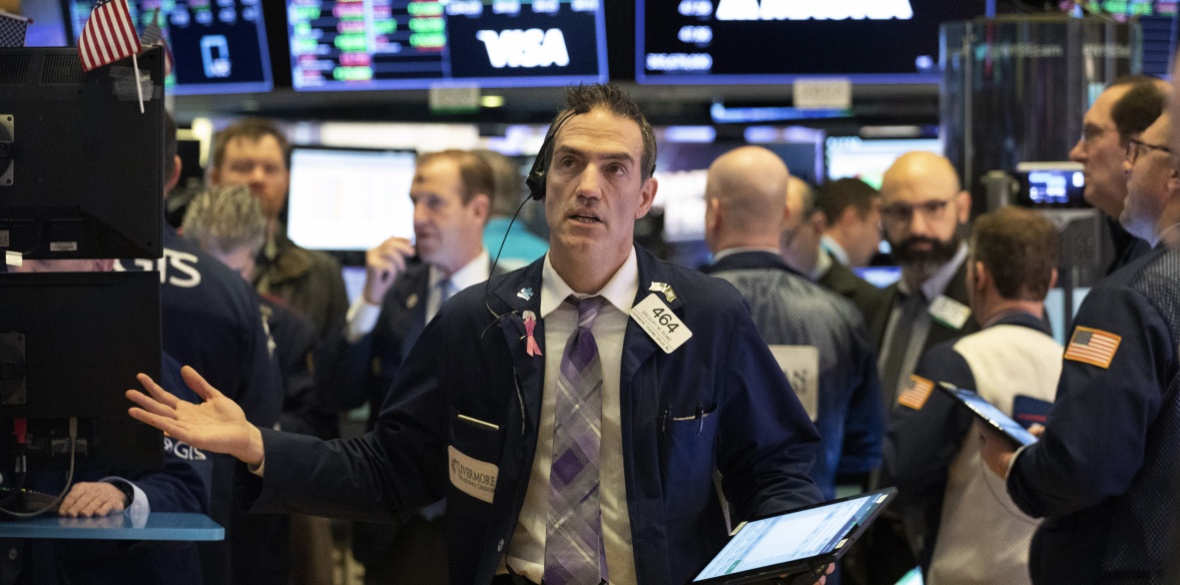This is the last article you can read this month
You can read more article this month
You can read more articles this month
Sorry your limit is up for this month
Reset on:
Please help support the Morning Star by subscribing here
FINANCIALISATION is the process whereby global financial institutions increasingly dominate our planet — the economy, society, the environment and our daily lives.
Financialisation is a shift in the composition of capital and in the way that capitalists accumulate wealth.
Following Britain’s industrial revolution in the late 18th century the principal source of profit — and the driver of capitalism — became the mass production and sale of goods — physical commodities.
Today profits come increasingly not from the production of goods but from the buying and selling of financial securities and the interest payments they accrue.
Bankers such as the Medicis in the 14th century funded trade — and wars — which drove the spread of early mercantile capitalism. The Bank of England was founded in 1694 as banker to the government to provide credit to build the British navy, develop new industrial processes and military hardware, enable landowners to “modernise” agriculture and facilitate colonial expansion. Until its nationalisation in 1946 it was privately owned by its stockholders.
In Marx’s day, financial capital was an important element in a primarily industrial economy. But until relatively recently the financial sector was in many ways secondary to the manufacturing and agricultural sectors.
Credit was used to finance production — a claim on the future production of surplus value. Today that is no longer the case.
More than a century ago Rudolf Hilferding wrote in his classic Marxist text, Finance Capital (1910) of the end of laissez-fair competition and the merging (and centralisation) of financial and industrial capital.
Monopolistic corporations, often organised as cartels and linked with a handful of corporate banks, operated exclusive trading zones.
Hilferding argued that paradoxically this might facilitate a socialist revolution, through state control of financial institutions and hence of production.
Lenin, in Imperialism, the Highest Stage of Capitalism (1916) wrote that “the 20th century marks the turning-point from the old capitalism to the new, from the domination of capital in general to the domination of finance capital.”
However, imperialist competition also produced geopolitical shifts. British dominance in world markets — and pre-eminence in industrial innovation — was challenged by Germany and the USA.
The process of financialisation was interrupted first by the first world war and then by recession. Following the end of the second world war a new phase of industrial and technological development was re-established in the capitalist world.
In Britain a quarter-century of growth — in the economy and of the organised working class — was accompanied by a degree of compromise between capital and labour (the “Keynes — Beveridge consensus”) reflected in what came to be known as the “mixed economy.”
Capital was prepared to tolerate taxpayer-funded public services (schools, hospitals, housing, welfare) and state ownership of infrastructure and utilities in order to maintain continued economic growth and profits. Not any more.
The current phase of financialisation really took off with the economic downturn of the early 1970s (before the Arab oil embargo quadrupled energy prices) and accelerated in the 1990s as, despite an abundance of low-wage labour, manufacturing profits began to fall at the same time as the world was awash with surplus funds (including petro-dollars) looking for ways to make more profit.
As a result, investors increasingly turned to “asset values” (dead, but extremely profitable capital): property (including “sub-prime” mortgages), commodity futures, even art.
“Leverage” (and even more surplus funds looking for somewhere to invest) was secured through credit — banks lending to consumers, to investors and to each other and accumulating liabilities many times the size of their reserves in the process.
The process is highly complex and is not limited to financial institutions. Internal trading within manufacturing companies, whose activities are international, allows production to be shifted to wherever labour costs are lowest, prices and profit statements to be manipulated to minimise tax, or take advantage of currency fluctuations.
The financialisation of industrial capital manifests itself in a host of ways — the automobile industry for example itself finances car purchases. Ford, a name traditionally associated with motor cars, is now also likely to be taken to mean Ford Money (offering ISAs and savings accounts paying “competitive” interest) — a spin-off from Ford Motor Company’s financial services arms.
Investment funds gambled on ever-increasing share prices in non-productive capital: put money into property, its “value” goes up, attracting more money and so on.
The continued “success” of capitalism is now dependent on what Marx called “fictitious” capital, especially credit — everything from credit cards and payday loans (3.2 million British households now spend over 25 per cent of their wage income on unsecured debt repayments) to the UK national debt (which has now passed £1.5 trillion, over 80 percent of GDP, with interest payments some 8 per cent of government tax income).
New financial markets — “shadow banking” — include credit default swaps, currency derivatives, hedge funds (placing two-way bets on currency or commodity futures); even pollution rights (“carbon credits”) supposedly meant to address the global climate crisis but in reality accelerating it.
Those who manage them have accumulated vast fortunes. They and their financial instruments have also acquired enormous power, able to dictate policy to entire (and supposedly “sovereign”) nation states.
The process is inherently unsustainable and was accelerated rather than checked by the crash of 2008 as banks went under or were “saved” through public investment (as with Northern Rock and RBS) and more generally through “quantitative easing” — transferring the burden of financial crisis from speculators to working people.
It was accompanied by the increased power of supra-national financial institutions, including the World Bank and the IMF (initially sidelined by the Reagan administration in the US as contrary to neoliberal philosophy, but hastily resurrected in the early 1980s when country after country became effectively bankrupt, unable to service their debts) which were able to impose “structural adjustment” programmes — cutting public expenditure, privatising health and social services, deregulating capital.
At the same time, supranational financial institutions though global in extent also need the state. The state is not, as so often presented, the “honest broker” of society. It is, ultimately, an organ of control. It’s there to ensure compliance.
And, paradoxically, as capital — particularly finance capital — becomes more and more global so individual nation-states become ever more critical to its survival.
As Walter Wriston, head of Citibank, put it following the crash of 2007-2008; “countries can’t disappear – you always know where to find them in the event of difficulties.”
Countries — “nations” — become the means by which the burden of the crises can be transferred to — imposed upon — “the many.”
Enforced “structural readjustment” started in Latin America and Africa and is currently being applied in Europe — France, Greece, Ireland, Italy, Portugal, Spain, the more recent EU accession states and, of course, Britain.
It masquerades as “living within your means;” it’s called “austerity.” But for the ruling class — in particularly for those who control financial capital — it is a means of shifting the burden of the inherent contradictions of an increasingly unstable and crisis-ridden system onto the backs of working people and their families.
Today financial capital and those who own and manage it dominate and control our lives. In or out of the EU, challenging it — and them — will be one of the most difficult tasks of any future left government.
This answer (number 59 in the series) was collectively edited by participants in the “Introduction to Marxism| series at the Marx Memorial Library and Workers’ School.
The next course, Capitalism, Crisis & Imperialism, starts tomorrow (Tuesday, March 3) at 7pm. Previous answers and details of all MML’s courses and lectures can be found on tinyurl.com/FullMarx.











